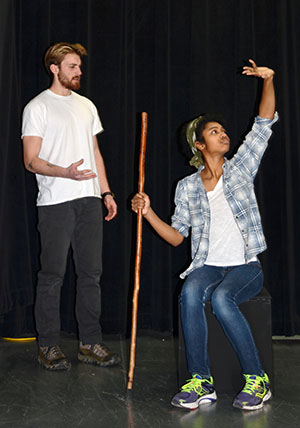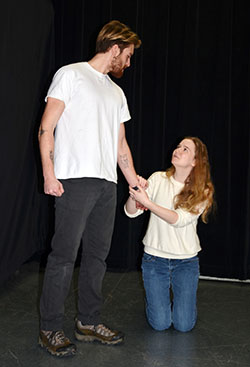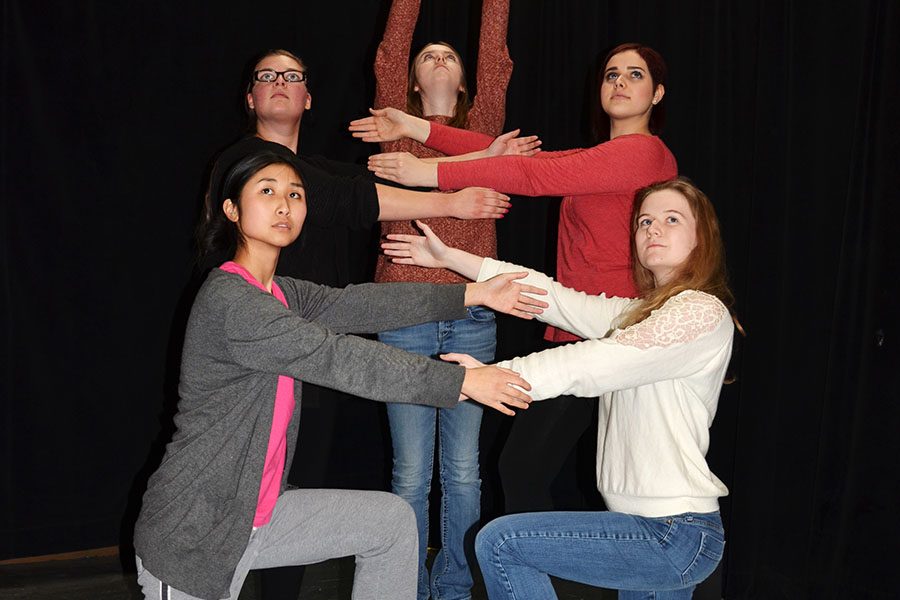Madison College Performing Arts presents ‘The Burial at Thebes’
January 17, 2017
Madison College Performing Arts will be presenting “The Burial at Thebes: An Adaptation of Sophocles’ Antigone” in the Mitby Theater starting Jan. 27. The cast of 13 actors have been working over the winter break to assemble the show.
“I always look at Antigone as one of the first feminists,” says director Mike Lussenden, “and unfortunately she pays the ultimate price for standing up for justice.”
 Lussenden has looked forward to putting on this production since he first saw “Burial at Thebes” in Milwaukee ten years ago at the Kennedy Center American College Theater Festival.
Lussenden has looked forward to putting on this production since he first saw “Burial at Thebes” in Milwaukee ten years ago at the Kennedy Center American College Theater Festival.
“I saw (the play) and went ‘That. That’s the version of ‘Antigone’ I want to do,’” he said.
The ancient story of a young woman who stands up to her government and king to give her brother an honorable burial has been performed for over 2,000 years, and in almost every language.
Lussenden has long admired the Greek tragedy of “Antigone,” but it was not until he saw the Irish poet Seamus Heaney’s adaptation that he knew he had to create it himself.
“Every version of ‘Antigone’ is so bound up in language that it almost becomes a burden to tell this wonderful, powerful story.”
Heaney’s translation is shorter than most Greek plays, being under 90 minutes, and the language more contemporary, which this production’s director sees as a good thing.
“The language of this play doesn’t feel stilted to me,” Lussenden said. “Even though it’s written in verse it doesn’t sound like verse for the most part. There are many lyrical moments and there are many poetic moments, but I think it’s a very accessible script.”
Robin Fonfara, Madison College dance instructor and the show’s director of choral movement, takes inspiration from the rhythms of the play, which range from iambic pentameter to unmetered verse and prose.
The chorus, a key figure in any Greek play, is a collection of actors who together act as the voice of the people. Fonfara has taken on the task of choreographing the movements and voices of the six actors in the chorus.
 “In some ways the Greek chorus is a living organism,” says Fonfara, “in that they are a group together that physically demonstrate all kinds of things. They demonstrate collective wisdom of a society; they demonstrate the collective good of individuals who work collaboratively. They represent society.”
“In some ways the Greek chorus is a living organism,” says Fonfara, “in that they are a group together that physically demonstrate all kinds of things. They demonstrate collective wisdom of a society; they demonstrate the collective good of individuals who work collaboratively. They represent society.”
Taking inspiration from poetic language in the text, Fonfara is relishing the chance to play with the delivery of the chorus’s lines. Because the lines are attributed simply to ‘Chorus’, it is a task for any production of a Greek play to decide how those lines will be delivered.
“The language of the chorus really is almost musical,” Fonfara comments. “It has a very set beat and you can play creatively with where the chorus speaks in unison, where they speak in layers as a poem may be spoken, or when they do things like an echo. So there is an opportunity for challenge and a lot of creativity with the choral work.”
That itch for challenge and creativity is shared by the cast and crew. Asked what has surprised him about the production so far, Lussenden said, “I’ve never had to yell at anyone about memorizing.”
Being freed from such technical concerns as memorization, the group is free to explore the larger themes of the play, along with technical design of the show.
“If the visual arts are integrated into the play the way we hope,” Lussenden explains, “we’ll see examples of people fighting each other, but we’ll also see examples of women who have stood the test of time woven into the scene changes.”
Although the performance will be on the Mitby stage, the staging will be such that half the stage is used for the performance and the other will be the audience. This will allow for the majesty of the space to work together with an intimacy of action.
More than anything, however, Lussenden’s goal is to share this ancient story with as many people as possible.
“If we achieve the goal of standing up for universal justice, if we achieve the goal of taking a 2,500+ year story and making it still compelling to a modern audience- if those two things happen, I think we’re successful.”
Tickets are free with a Madison College OneCard.































